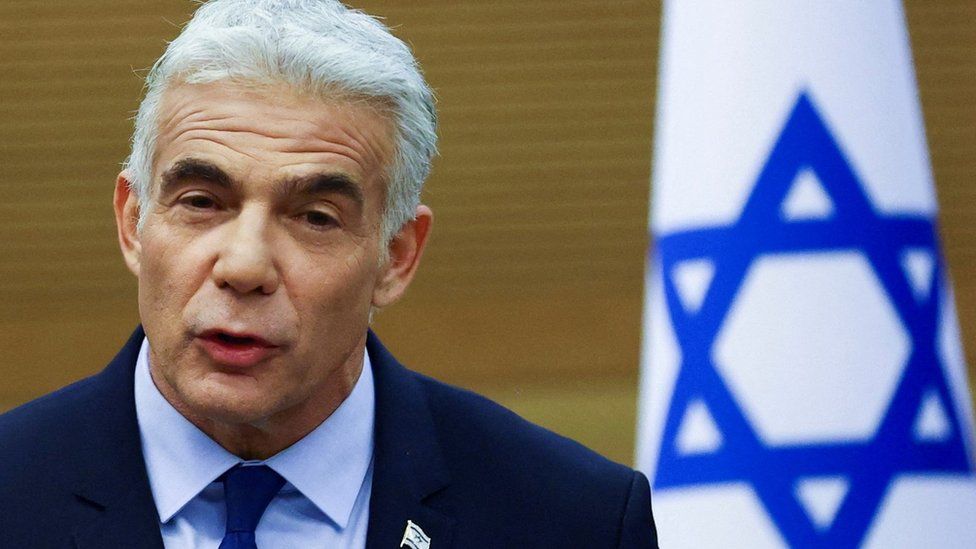ARTICLE AD BOX
By Yolande Knell
BBC News, Jerusalem
 Image source, Reuters
Image source, Reuters
Mr Lapid will take over as prime minister under a power-sharing deal
In the 10-years since he turned from a political chat-show host to politician, Yair Lapid has dreamed of becoming Israel's prime minister.
Now, as he prepares to take over in a caretaker capacity, the centrist will be looking to prove that he deserves the top job in the long term, as the country prepares to go to the polls for the fifth time in under four years.
The former amateur boxer is sure to face dogged attacks from conservative Benjamin Netanyahu - Israel's longest serving leader - whom he successfully knocked out of office in 2021 by forging an unlikely alliance between eight, ideologically diverse political parties.
Following the vote to dissolve parliament, Mr Lapid, who has been foreign minister, takes over because of his power-sharing deal with the right-wing, religious nationalist Naftali Bennett, who was prime minister for the past year.
He is set to be in charge at least for an interim period until a new government is formed after polls due in October or November, and possibly beyond if no coalition can be formed.
"Even if we are going to elections in a few months, the challenges we face will not wait," Mr Lapid said as he stood alongside Mr Bennett to announce the end of their coalition government, which had been struggling with in-fighting and had lost its razor-thin majority.
Sounding like he was already on the campaign trail, he listed the pressing issues he saw for Israel: high living costs and security threats in the Gaza Strip, Lebanon and Iran.
In a jab at Mr Netanyahu - who remains on trial on corruption charges, which he denies - he pledged to stand up against "the forces threatening to turn Israel into a non-democratic country".
Image source, AFP
Image caption,Mr Lapid's centrist Yesh Atid party came an unexpected second in the 2013 election
Yair Lapid was born in Tel Aviv in 1963. His mother was a writer while his father, a Holocaust survivor, was also a journalist who entered politics and was known as an outspoken supporter of secularism.
During his army service, Mr Lapid worked as a reporter for a military magazine. He did not go on to university but wrote newspaper columns, books and scripts, composed songs, and acted in films, before moving into television, helped by his chiselled, good looks.
As a TV news anchor, he successfully challenged those in power in interviews. Although, over the years, video footage from one show has haunted him - during an interview with Benjamin Netanyahu, then heading the treasury, Mr Lapid declared: "I don't know anything about economics."
Yet Mr Lapid's political career was launched on the back of socio-economic protests in 2011. He formed his Yesh Atid (There is a future) party with a promise to tackle bread-and-butter, middle-class issues.
In the 2013 election, it performed strongly, focusing on high housing costs, education reforms, and scrapping exemptions from military service for the ultra-Orthodox Jewish community resented by many secular Israelis.
Yesh Atid ultimately joined a coalition led by Mr Netanyahu's Likud party. Mr Lapid was finance minister until late 2014, when tensions between the two men led to his dismissal.
After subsequent elections, Mr Lapid established himself as an opposition leader, frequently clashing with the prime minister. In 2018, when police recommended that Mr Netanyahu face corruption charges, Mr Lapid was named as a key witness in one case against him.
Image source, Getty Images
Image caption,Mr Lapid served as finance minister under Benjamin Netanyahu between 2013 and 2014
As prime minister, Yair Lapid will have the honour of greeting the US President Joe Biden when he visits Israel next month and addressing the UN General Assembly in September.
When it comes to the key issue of Israel's long-running conflict with the Palestinians, he can be expected to take a more moderate view than his recent predecessors. Mr Lapid has expressed commitment to a two-state solution. However, he remains uncompromising on some core points.
He previously made clear to me in an interview that Jerusalem should remain the undivided capital of Israel, saying Palestinian claims to the east of the city, as capital of their hoped-for future state were "totally bogus" with "no historical roots".
While Benjamin Netanyahu - seeking his sixth term in office - will seek to paint his bitter rival as weak on security, particularly when it comes to Iran and terrorism, the challenge for Yair Lapid is to prove he can protect Israel from its enemies and promote domestic unity. He must also overcome opposition portrayals of him as representing a narrow, privileged Tel Aviv elite.
Image source, Reuters
Image caption,Mr Lapid worked with an array of other parties as part of Israel's most diverse coalition
While he remains intensely disliked by ultra-Orthodox parties, Mr Lapid has shown he can work with different partners to achieve his goals. He teamed up with former military chief and current Defence Minister Benny Gantz for a set of inconclusive elections from 2019, before engineering last year's broad coalition, united by the goal of replacing Mr Netanyahu.
The government - which included an Arab Islamist party for the first time - won global praise for its inclusivity in an era of political tribalism. Its achievements included managing two coronavirus waves, passing Israel's first budget in more than three years, and improving ties with Washington and Arab allies.
Polls currently suggest that Likud will win the biggest number of seats in the next election but that, with its partners, it would remain short of a governing majority in parliament.
In the coming months from within the prime minister's residence, Yair Lapid will be working to achieve the politically unexpected once again, trying to ensure that after Israel votes, he can hold onto the reins of power.

 2 years ago
21
2 years ago
21








 English (US)
English (US)